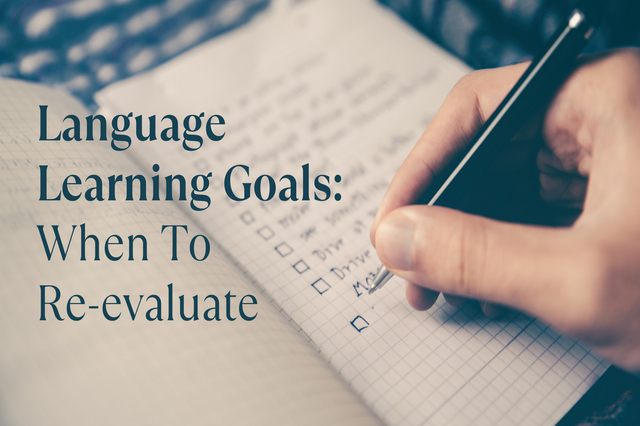
Often when someone wants to start learning a foreign language they begin with a vague goal. It’s understandable because they don’t know how to set up a Specific, Measurable, Achievable, Realistic, and Timely (SMART) goal yet.
Even if they know it’s not a one-time set-and-forget thing.
An evaluation is needed to know if the goals have been achieved as well as the effectiveness of the chosen methods. But, how do we evaluate them? How often?
That depends on you.
It’s like if you want to know your understanding of the language so far, take a test. It could be monthly, every 3 months, etc.
As for how refer back to your goal. For me, it’s to be able to watch Spanish-related entertainment without subtitles. So, I started watching any TV series I could get my hands on with English subs first. I don’t remember for how long though.
One day, I just began watching without it and was able to understand around 70%. Obviously, that wasn’t my only method. Around the same time, I learned some vocabulary and grammar too.
However, I still prefer English subs for now. I can understand that much simply because the vocabulary used was somewhat easy.

So, if your goal is to improve your listening skills align your methods with that. Do things such as listening to music, podcasts, radio, audiobooks, etc.
I admit I only re-evaluated my goal early this year when I felt satisfied with my progress and I think it’s time to set a new one.
Now, let’s talk about re-evaluating the effectiveness of your methods.
Sometimes people are using the right methods the wrong way. When it doesn’t produce the results they desire they are quick to say it’s fruitless. Figure out what causes it, try a different approach and see if the outcomes are still the same.
If yes, then perhaps time to ditch them. Some methods just don’t work well for everybody.
Take podcasts as an example. In an attempt to sharpen their listening skills, learner A is listening passively while learner B is actively.
The latter will get better results. Even when the former is able to pick up certain words or phrases they are going to sleep on them until they decide to do something.
A different approach such as writing down (with personal examples), having constant practice, using them when talking to natives, associating images, etc would undoubtedly give finer results.
I understand not all people fancy writing down. Just like when it comes to exams some people literally rewrite the important points in a notebook while others simply memorize them as is.
Different personalities have different approaches. Do whichever you feel comfortable with as long as it’s practical and effective.

Indeed, passive learning is undemanding unlike the opposite but it can be boring and unchallenging at times. But again, doing too much active learning can be mentally exhausting too.
If you can mix both wouldn’t it be more enjoyable because they are balanced?
I think it's very important to spend a reasonable amount of time developing your language learning skills. Learning languages is something you may invest thousands of hours into, so it's worth spending just 1% of that time trying to optimise the process - owarren
Before you re-evaluate everything, think for a moment.
Has the time you put into honing your skills been long enough? What about your attitude throughout the process? Are you being patient? Have you achieved your goals? What’s wrong with the current ones? Ask yourself lots of questions.
If it works well, don’t bother fixing it.
So, have you re-evaluated your goals before? What are the things you take into account?
©2025 Together We Learn More
©2025 Together We Learn More
Alejandro Ayala says:
Nice post!!
Meina says:
¡Muchísimas gracias, Alejandro!